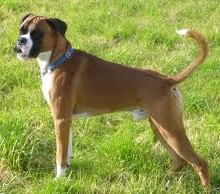Boxer
Lifestyle Needs

The Boxer is a big, strong and usually confident dog. He can be a good guard dog, usually has plenty of stamina but needs a firm hand. He can be a good family dog. He needs plenty of stimulation and exercise and an owner who is prepared to commit to this. An owner would also need to be tolerant of his possible drooling and flatulence. An advantage is his short coat which does not need a huge amount of grooming. Average lifespan 9 years.
Genetic Diversity
(Known as Coefficient of Inbreeding: 'COI'. It should be as low as possible.)
The UK Kennel Club breed average COI is 7.1% - See 'A Beginners Guide to COI'
Gene Pool Size
(Known as Effective Population Size: 'EPS')
80.9
EPS is a measure of how many individuals are contributing genetically to a breed population. It is a measure of the size of the gene pool in a breed. Lower than 100 is considered critical by conservationists and below 50 brings a breed close to extinction. For more information see the Kennel Club article.
Health and Welfare Problems due to Conformation
(Body shape and physical characteristics)
- Brachycephalic Obstructive Airway Syndrome (BOAS)
- Gastric dilatation volvulus (Bloat/Torsion)
- Deafness (associated with white coat colour)
BVA/KC Health Schemes: www.bva.co.uk/chs
- Hip dysplasia breed 5 year mean score 15.8 (parents should be lower)
- Elbow dysplasia: ideally 0:0
- Eye Scheme: Eye testing in brachycephalic dogs should be routine as a short head can cause health and welfare problems
- Eye Scheme Screening for Eye Disease is essential for male and female dogs used for breeding
Estimated Breeding Values (EBVs) : No EBVs are currently available for this breed
www.thekennelclub.org.uk/about-ebvs
DNA Tests Available
DogWellNet and IPFD Harmonisation of Genetic Testing for Dogs (HGTD)
www.dogwellnet.com/breeds
- Degenerative myelopathy (DM)
- Factor V111 Deficiency (Haemophilia A)
Availability of a DNA test does not mean that it is always necessary or even desirable for breeders to use this test.
Other Breed-Specific Health Screening Schemes
- Heart Disease: Aortic Stenosis www.boxerbreedcouncil.co.uk/as.html
- Progressive Axonopathy – Breed Council Scheme
Ask the breeder to show you the certificates for the above tests/screening for both parents. If any of the above tests have not been considered necessary by the breeder (and there may be good reasons), ask her to explain why.
Other Diseases Reported
(For which there are currently no genetic or screening tests for sire or dam)
- Cranial cruciate ligament disease (CCL)
- Cancer: lymphoma; mast cell tumour (MCT) and others
- Juvenile kidney disease (JKD)
- Allergies
- Corneal ulceration
- Cardiomyopathy
- Gastric dilatation volvulus (‘Bloat’)
- Gastrointestinal disease
- Hormonal problems
Ask the breeder about the medical history of the parents, grandparents and great grandparents. Consider carefully whether to purchase a puppy if some of these or other diseases are in the family line.
Ask about the breeder’s policy in cases of serious genetic diseases occurring to your puppy in later life. Good breeders will request to be informed of such events in order to improve future breeding decisions.
You are strongly advised to buy from a breeder who uses (or is prepared to use) the AWF Puppy Contract and Puppy Information Pack (PIP): www.puppycontract.org.uk
The breeder should also be familiar with the CFSG/DBRG Code of Practice for Dog Breeding